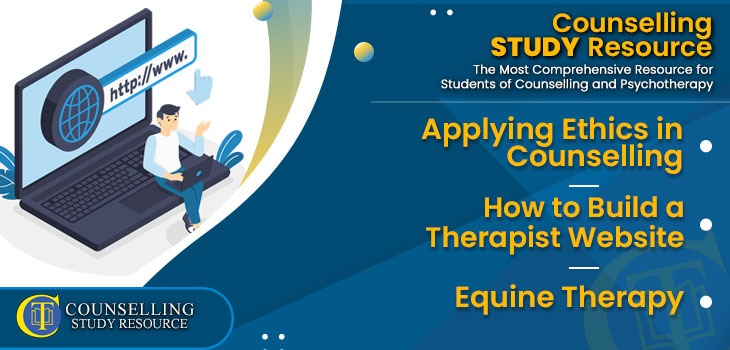241 – How to Build a Therapist Website
Applying Ethics in Counselling – Equine Therapy
In Episode 241 of the Counselling Tutor Podcast, your hosts Rory Lees-Oakes and Ken Kelly take us through this week’s three topics:
- Starting with ‘Theory in Practice’, we’ll look at ethics and their importance in counselling.
- Next in ‘Practice Partner’, we have Daragh Mac Loughlin from webhealer.net to talk about how to build a therapist website.
- And lastly in ‘Practice Matters’, Rory speaks with Dr Danielle Mills about equine therapy.
Applying Ethics in Counselling [starts at 03:05 mins]
Counselling Foundations is sponsored by
Counselling Skills Academy
Learn counselling techniques by seeing counselling skills used in real sessions by qualified therapists.
Real sessions - real-life presentations - real skills.
Ethics are an essential part of your practice, and are something you’ll have to think about when it comes to working with clients.
The key points of this discussion include:
- Ethics provide an agreed upon right and wrong within the therapy room.
- Your ethical framework will help to guide your actions.
- There are ethics that are counselling specific.
- They set out standard expectations.
- If you receive a complaint, your ethical body will ask how you used the ethical code to make your decisions. Use your ethical body’s code as an external opinion when making your decisions.
- Make your ethical framework available to your client – this transparency in your practice will help you to build trust.
- Your ethical framework will provide personal policies for you to work towards.
- As always, keeping client notes safe and confidential is another branch of your ethical responsibilities as a counsellor.
A handout on the Role of an Ethical Body is available for download in the green button above.
How to Build a Therapist Website [starts at 24:13 mins]
In this week’s section of ‘Practice Partner’, Rory speaks with guest Daragh Mac Loughlin from webhealer.net about building yourself a website as a counsellor, and the things you’ll want to consider:
- The first thing to consider is whether you're going to make your website yourself or have a professional do it for you.
- Will the quality of your website reflect the quality of your practice if you are to make it for yourself? Do you understand the behind the scenes aspects that need to be considered such as search engine optimization (SEO)?
- Could your time be better spent improving your practice through CPD etc?
- When talking to a professional about building your therapist website, make sure you’re comfortable with the price - maybe ask for quotes from a few different people before making your decision.
- Do they offer after sale service? Will they help you if you meet difficulty with your website further down the line?
- Make sure the designer you choose has plenty of time to give to your website.
- When thinking about how to get your therapist website to the top of search engines, think about who’s going to land on your website, and what they will be looking for. Make sure you have a clear purpose with your website.
- Google is looking for ‘EAT’ – expertise, authority, and trustworthiness. You're going to want to make sure all three of these things are shown clearly through your website.
- SEO – your designer will be familiar with the term and check certain boxes to give your website the best chance, such as being mindful of heading size etc.
- Your website is a place to display how capable you are.
- A blog might be a good thing to consider – giving your clients a platform to land on before they venture into the main body of your website.
- Cookies – the customer will have to be made aware of what cookies you're using, but try not to make your cookies announcement annoying or distracting.
- When working with a designer, collaboration and understanding is important. They should know who you're making your website for, and how best to appeal to that.
- Add a picture – start building rapport with your possible client. It will also be helpful to add in some information about you, and your qualifications.
- Think of your website like a shop front – keep it up to date.
- When thinking of a domain name, it’s best to keep it short, sweet, and reflective of you and your practice.
Equine Therapy [starts at 1:01:56 mins]
The National Counselling Society is proud to sponsor Practice Matters.
NCS are really excited to have launched their Children and Young People Therapist Register for counsellors working with the younger age group.
In this week’s ‘Practice Matters’, Rory speaks with Dr Danielle Mills about equine therapy.
The main points of this discussion include:
- You’ll need to be dual qualified to work in equine therapy.
- Equine therapy is good for clients who have found talking in therapy difficult.
- It can also be used as a bridging therapy before a client moves into the therapy room.
- By taking the focus off the conversation, equine therapy can help clients to talk about something really difficult.
- A horse will react as you react to it; it is a very grounded animal.
- If it’s not helpful to the horse, it’s not helpful for anyone – it is important to be ethical and make sure the horse is treated with respect. This will help the client to feel more at ease/comfortable as they too will feel that sense of respect from you.


